Aging Matters: Life Portfolio - Gerontology Reflection Paper
VerifiedAdded on 2022/09/15
|6
|1815
|20
Report
AI Summary
This life portfolio is a reflection on aging and retirement, focusing on creating a fulfilling life after retirement. The student outlines goals including increased family commitment, spiritual development, and leisure activities. Key factors influencing these goals include financial security, housing, and cultural considerations. Strategies for achieving these goals involve investing in a pension plan, pursuing hobbies, and securing a job in the public sector. The assignment emphasizes the importance of early retirement planning to ensure a peaceful and worry-free post-retirement life, covering financial planning, housing, leisure activities, and cultural impacts, and offering actionable strategies to achieve a successful retirement.
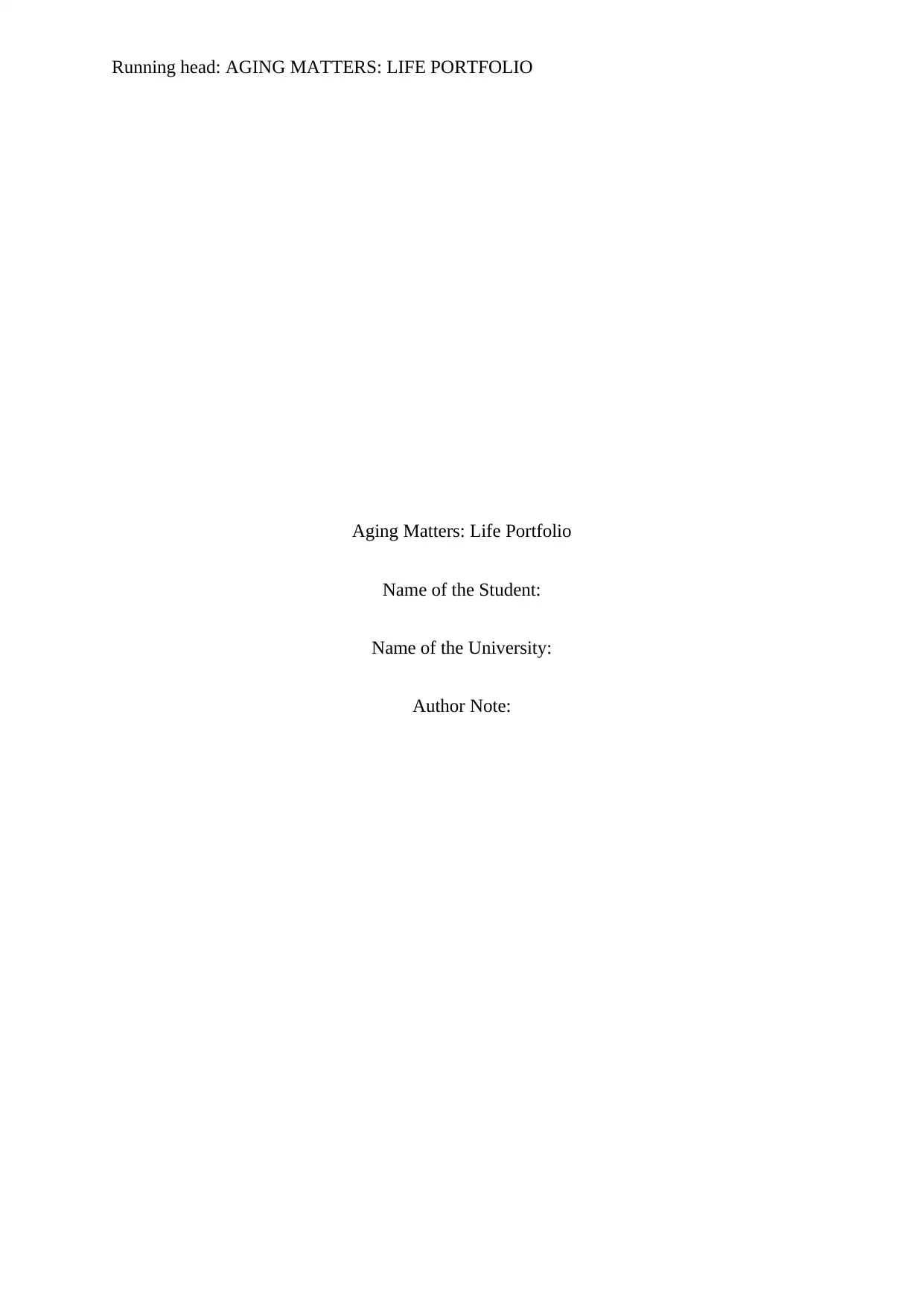
Running head: AGING MATTERS: LIFE PORTFOLIO
Aging Matters: Life Portfolio
Name of the Student:
Name of the University:
Author Note:
Aging Matters: Life Portfolio
Name of the Student:
Name of the University:
Author Note:
Paraphrase This Document
Need a fresh take? Get an instant paraphrase of this document with our AI Paraphraser
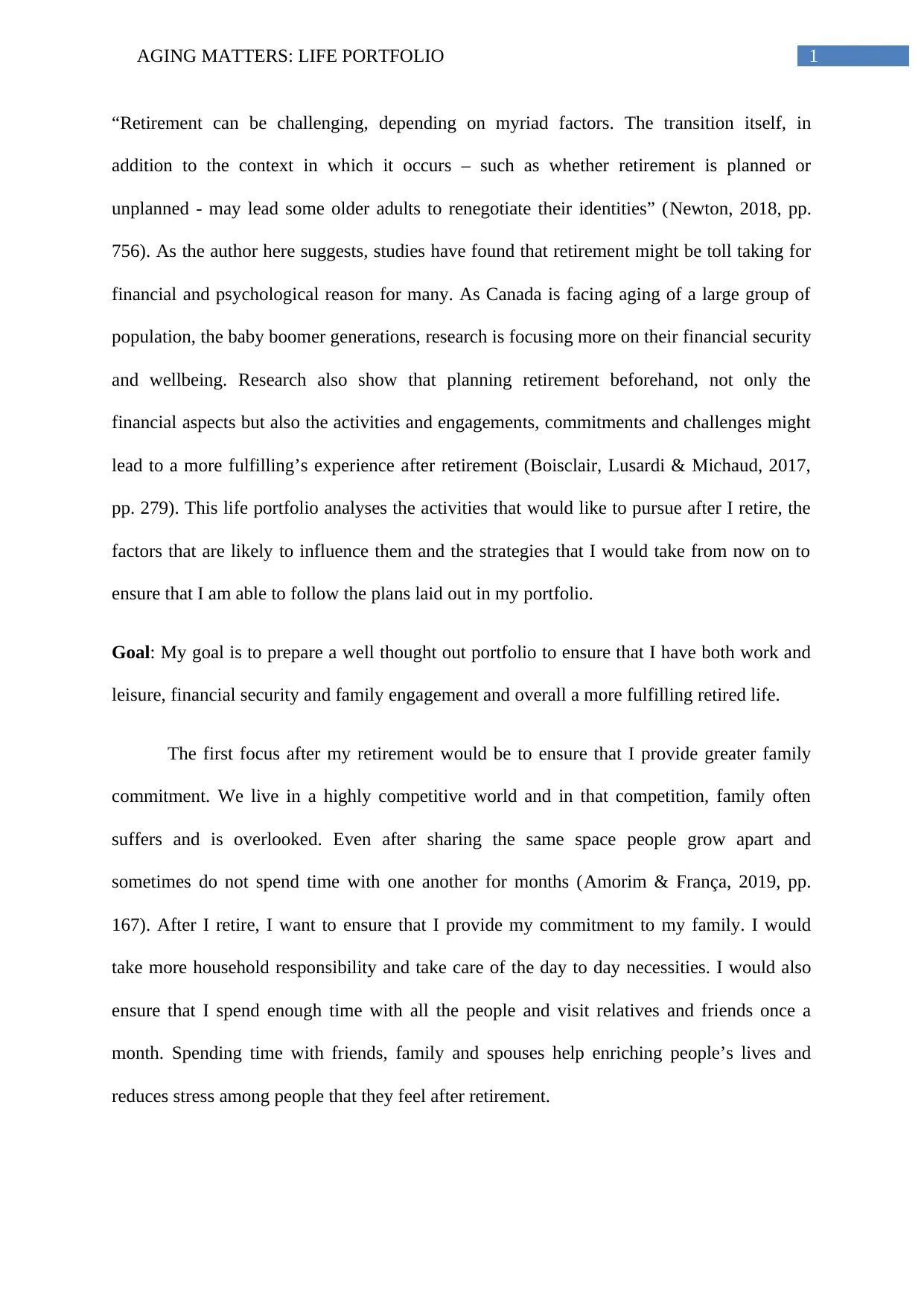
1AGING MATTERS: LIFE PORTFOLIO
“Retirement can be challenging, depending on myriad factors. The transition itself, in
addition to the context in which it occurs – such as whether retirement is planned or
unplanned - may lead some older adults to renegotiate their identities” (Newton, 2018, pp.
756). As the author here suggests, studies have found that retirement might be toll taking for
financial and psychological reason for many. As Canada is facing aging of a large group of
population, the baby boomer generations, research is focusing more on their financial security
and wellbeing. Research also show that planning retirement beforehand, not only the
financial aspects but also the activities and engagements, commitments and challenges might
lead to a more fulfilling’s experience after retirement (Boisclair, Lusardi & Michaud, 2017,
pp. 279). This life portfolio analyses the activities that would like to pursue after I retire, the
factors that are likely to influence them and the strategies that I would take from now on to
ensure that I am able to follow the plans laid out in my portfolio.
Goal: My goal is to prepare a well thought out portfolio to ensure that I have both work and
leisure, financial security and family engagement and overall a more fulfilling retired life.
The first focus after my retirement would be to ensure that I provide greater family
commitment. We live in a highly competitive world and in that competition, family often
suffers and is overlooked. Even after sharing the same space people grow apart and
sometimes do not spend time with one another for months (Amorim & França, 2019, pp.
167). After I retire, I want to ensure that I provide my commitment to my family. I would
take more household responsibility and take care of the day to day necessities. I would also
ensure that I spend enough time with all the people and visit relatives and friends once a
month. Spending time with friends, family and spouses help enriching people’s lives and
reduces stress among people that they feel after retirement.
“Retirement can be challenging, depending on myriad factors. The transition itself, in
addition to the context in which it occurs – such as whether retirement is planned or
unplanned - may lead some older adults to renegotiate their identities” (Newton, 2018, pp.
756). As the author here suggests, studies have found that retirement might be toll taking for
financial and psychological reason for many. As Canada is facing aging of a large group of
population, the baby boomer generations, research is focusing more on their financial security
and wellbeing. Research also show that planning retirement beforehand, not only the
financial aspects but also the activities and engagements, commitments and challenges might
lead to a more fulfilling’s experience after retirement (Boisclair, Lusardi & Michaud, 2017,
pp. 279). This life portfolio analyses the activities that would like to pursue after I retire, the
factors that are likely to influence them and the strategies that I would take from now on to
ensure that I am able to follow the plans laid out in my portfolio.
Goal: My goal is to prepare a well thought out portfolio to ensure that I have both work and
leisure, financial security and family engagement and overall a more fulfilling retired life.
The first focus after my retirement would be to ensure that I provide greater family
commitment. We live in a highly competitive world and in that competition, family often
suffers and is overlooked. Even after sharing the same space people grow apart and
sometimes do not spend time with one another for months (Amorim & França, 2019, pp.
167). After I retire, I want to ensure that I provide my commitment to my family. I would
take more household responsibility and take care of the day to day necessities. I would also
ensure that I spend enough time with all the people and visit relatives and friends once a
month. Spending time with friends, family and spouses help enriching people’s lives and
reduces stress among people that they feel after retirement.
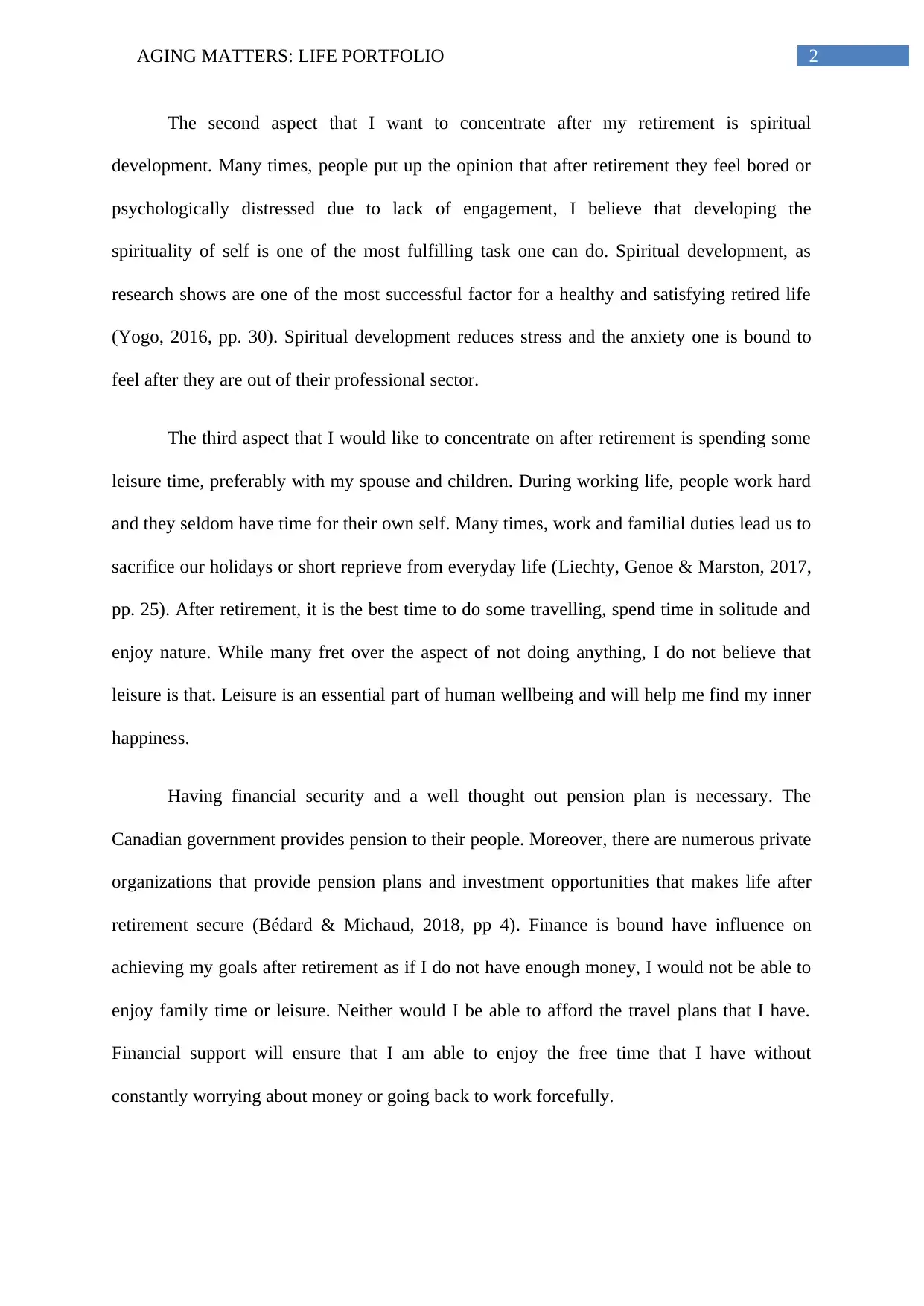
2AGING MATTERS: LIFE PORTFOLIO
The second aspect that I want to concentrate after my retirement is spiritual
development. Many times, people put up the opinion that after retirement they feel bored or
psychologically distressed due to lack of engagement, I believe that developing the
spirituality of self is one of the most fulfilling task one can do. Spiritual development, as
research shows are one of the most successful factor for a healthy and satisfying retired life
(Yogo, 2016, pp. 30). Spiritual development reduces stress and the anxiety one is bound to
feel after they are out of their professional sector.
The third aspect that I would like to concentrate on after retirement is spending some
leisure time, preferably with my spouse and children. During working life, people work hard
and they seldom have time for their own self. Many times, work and familial duties lead us to
sacrifice our holidays or short reprieve from everyday life (Liechty, Genoe & Marston, 2017,
pp. 25). After retirement, it is the best time to do some travelling, spend time in solitude and
enjoy nature. While many fret over the aspect of not doing anything, I do not believe that
leisure is that. Leisure is an essential part of human wellbeing and will help me find my inner
happiness.
Having financial security and a well thought out pension plan is necessary. The
Canadian government provides pension to their people. Moreover, there are numerous private
organizations that provide pension plans and investment opportunities that makes life after
retirement secure (Bédard & Michaud, 2018, pp 4). Finance is bound have influence on
achieving my goals after retirement as if I do not have enough money, I would not be able to
enjoy family time or leisure. Neither would I be able to afford the travel plans that I have.
Financial support will ensure that I am able to enjoy the free time that I have without
constantly worrying about money or going back to work forcefully.
The second aspect that I want to concentrate after my retirement is spiritual
development. Many times, people put up the opinion that after retirement they feel bored or
psychologically distressed due to lack of engagement, I believe that developing the
spirituality of self is one of the most fulfilling task one can do. Spiritual development, as
research shows are one of the most successful factor for a healthy and satisfying retired life
(Yogo, 2016, pp. 30). Spiritual development reduces stress and the anxiety one is bound to
feel after they are out of their professional sector.
The third aspect that I would like to concentrate on after retirement is spending some
leisure time, preferably with my spouse and children. During working life, people work hard
and they seldom have time for their own self. Many times, work and familial duties lead us to
sacrifice our holidays or short reprieve from everyday life (Liechty, Genoe & Marston, 2017,
pp. 25). After retirement, it is the best time to do some travelling, spend time in solitude and
enjoy nature. While many fret over the aspect of not doing anything, I do not believe that
leisure is that. Leisure is an essential part of human wellbeing and will help me find my inner
happiness.
Having financial security and a well thought out pension plan is necessary. The
Canadian government provides pension to their people. Moreover, there are numerous private
organizations that provide pension plans and investment opportunities that makes life after
retirement secure (Bédard & Michaud, 2018, pp 4). Finance is bound have influence on
achieving my goals after retirement as if I do not have enough money, I would not be able to
enjoy family time or leisure. Neither would I be able to afford the travel plans that I have.
Financial support will ensure that I am able to enjoy the free time that I have without
constantly worrying about money or going back to work forcefully.
⊘ This is a preview!⊘
Do you want full access?
Subscribe today to unlock all pages.

Trusted by 1+ million students worldwide
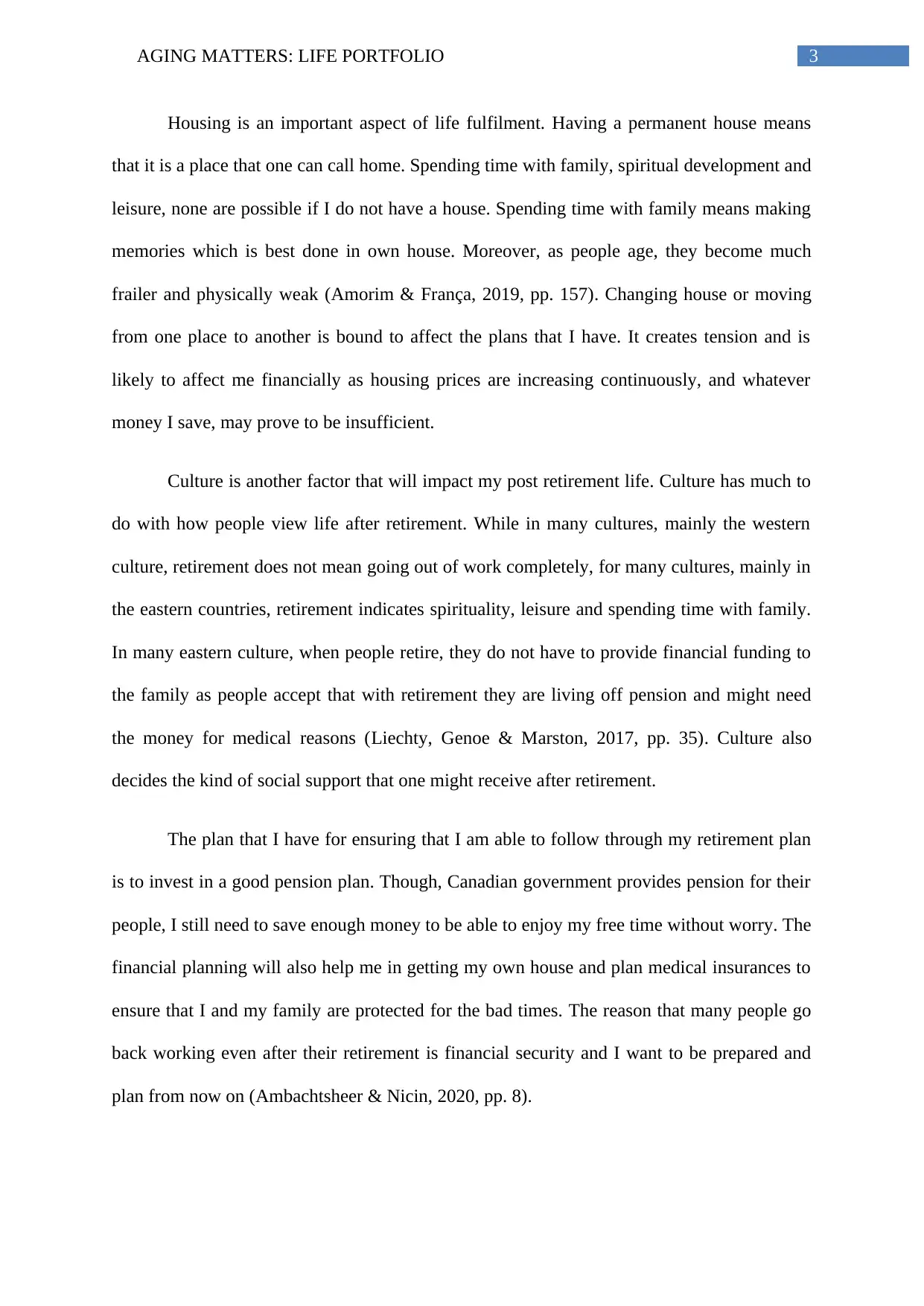
3AGING MATTERS: LIFE PORTFOLIO
Housing is an important aspect of life fulfilment. Having a permanent house means
that it is a place that one can call home. Spending time with family, spiritual development and
leisure, none are possible if I do not have a house. Spending time with family means making
memories which is best done in own house. Moreover, as people age, they become much
frailer and physically weak (Amorim & França, 2019, pp. 157). Changing house or moving
from one place to another is bound to affect the plans that I have. It creates tension and is
likely to affect me financially as housing prices are increasing continuously, and whatever
money I save, may prove to be insufficient.
Culture is another factor that will impact my post retirement life. Culture has much to
do with how people view life after retirement. While in many cultures, mainly the western
culture, retirement does not mean going out of work completely, for many cultures, mainly in
the eastern countries, retirement indicates spirituality, leisure and spending time with family.
In many eastern culture, when people retire, they do not have to provide financial funding to
the family as people accept that with retirement they are living off pension and might need
the money for medical reasons (Liechty, Genoe & Marston, 2017, pp. 35). Culture also
decides the kind of social support that one might receive after retirement.
The plan that I have for ensuring that I am able to follow through my retirement plan
is to invest in a good pension plan. Though, Canadian government provides pension for their
people, I still need to save enough money to be able to enjoy my free time without worry. The
financial planning will also help me in getting my own house and plan medical insurances to
ensure that I and my family are protected for the bad times. The reason that many people go
back working even after their retirement is financial security and I want to be prepared and
plan from now on (Ambachtsheer & Nicin, 2020, pp. 8).
Housing is an important aspect of life fulfilment. Having a permanent house means
that it is a place that one can call home. Spending time with family, spiritual development and
leisure, none are possible if I do not have a house. Spending time with family means making
memories which is best done in own house. Moreover, as people age, they become much
frailer and physically weak (Amorim & França, 2019, pp. 157). Changing house or moving
from one place to another is bound to affect the plans that I have. It creates tension and is
likely to affect me financially as housing prices are increasing continuously, and whatever
money I save, may prove to be insufficient.
Culture is another factor that will impact my post retirement life. Culture has much to
do with how people view life after retirement. While in many cultures, mainly the western
culture, retirement does not mean going out of work completely, for many cultures, mainly in
the eastern countries, retirement indicates spirituality, leisure and spending time with family.
In many eastern culture, when people retire, they do not have to provide financial funding to
the family as people accept that with retirement they are living off pension and might need
the money for medical reasons (Liechty, Genoe & Marston, 2017, pp. 35). Culture also
decides the kind of social support that one might receive after retirement.
The plan that I have for ensuring that I am able to follow through my retirement plan
is to invest in a good pension plan. Though, Canadian government provides pension for their
people, I still need to save enough money to be able to enjoy my free time without worry. The
financial planning will also help me in getting my own house and plan medical insurances to
ensure that I and my family are protected for the bad times. The reason that many people go
back working even after their retirement is financial security and I want to be prepared and
plan from now on (Ambachtsheer & Nicin, 2020, pp. 8).
Paraphrase This Document
Need a fresh take? Get an instant paraphrase of this document with our AI Paraphraser
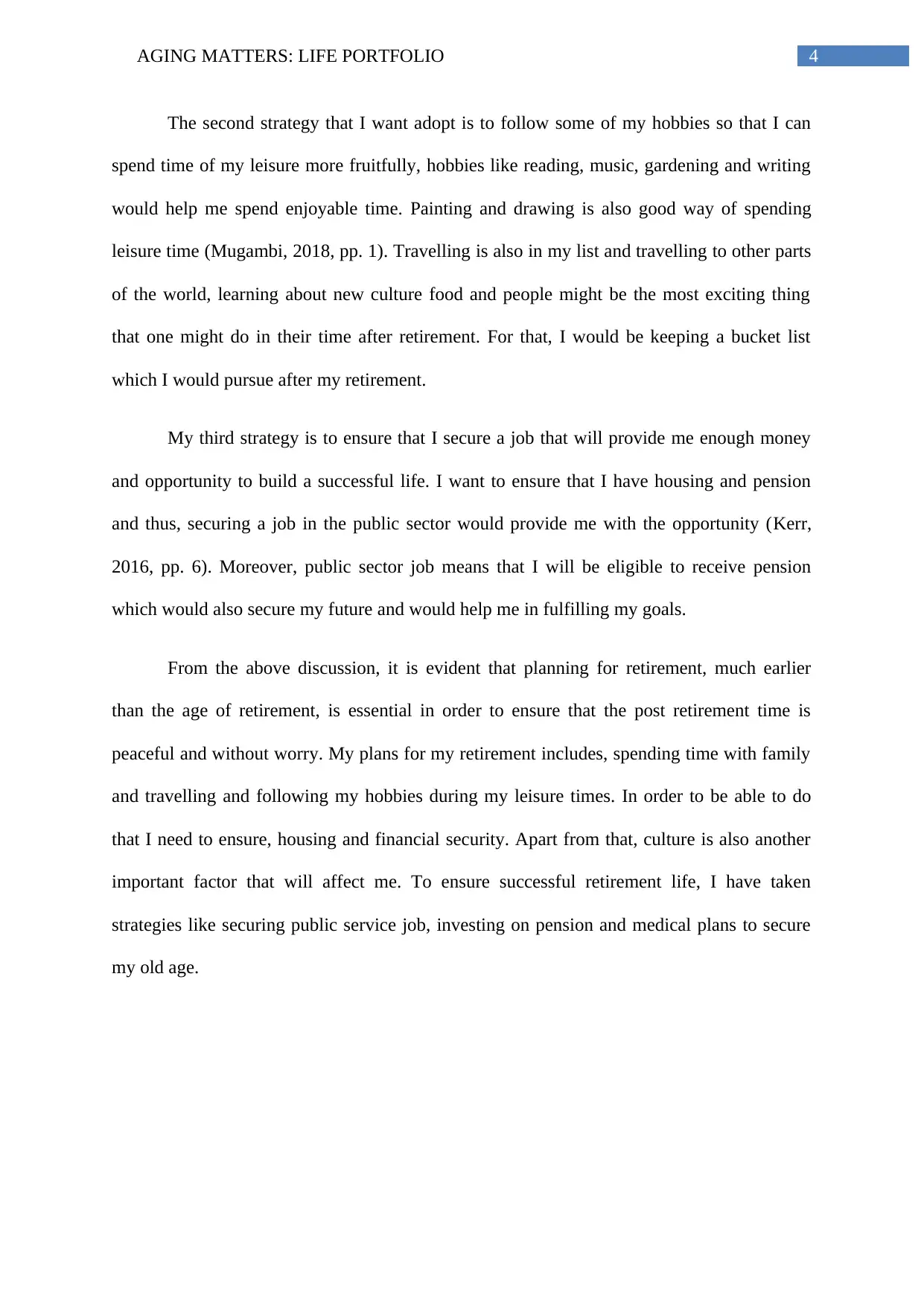
4AGING MATTERS: LIFE PORTFOLIO
The second strategy that I want adopt is to follow some of my hobbies so that I can
spend time of my leisure more fruitfully, hobbies like reading, music, gardening and writing
would help me spend enjoyable time. Painting and drawing is also good way of spending
leisure time (Mugambi, 2018, pp. 1). Travelling is also in my list and travelling to other parts
of the world, learning about new culture food and people might be the most exciting thing
that one might do in their time after retirement. For that, I would be keeping a bucket list
which I would pursue after my retirement.
My third strategy is to ensure that I secure a job that will provide me enough money
and opportunity to build a successful life. I want to ensure that I have housing and pension
and thus, securing a job in the public sector would provide me with the opportunity (Kerr,
2016, pp. 6). Moreover, public sector job means that I will be eligible to receive pension
which would also secure my future and would help me in fulfilling my goals.
From the above discussion, it is evident that planning for retirement, much earlier
than the age of retirement, is essential in order to ensure that the post retirement time is
peaceful and without worry. My plans for my retirement includes, spending time with family
and travelling and following my hobbies during my leisure times. In order to be able to do
that I need to ensure, housing and financial security. Apart from that, culture is also another
important factor that will affect me. To ensure successful retirement life, I have taken
strategies like securing public service job, investing on pension and medical plans to secure
my old age.
The second strategy that I want adopt is to follow some of my hobbies so that I can
spend time of my leisure more fruitfully, hobbies like reading, music, gardening and writing
would help me spend enjoyable time. Painting and drawing is also good way of spending
leisure time (Mugambi, 2018, pp. 1). Travelling is also in my list and travelling to other parts
of the world, learning about new culture food and people might be the most exciting thing
that one might do in their time after retirement. For that, I would be keeping a bucket list
which I would pursue after my retirement.
My third strategy is to ensure that I secure a job that will provide me enough money
and opportunity to build a successful life. I want to ensure that I have housing and pension
and thus, securing a job in the public sector would provide me with the opportunity (Kerr,
2016, pp. 6). Moreover, public sector job means that I will be eligible to receive pension
which would also secure my future and would help me in fulfilling my goals.
From the above discussion, it is evident that planning for retirement, much earlier
than the age of retirement, is essential in order to ensure that the post retirement time is
peaceful and without worry. My plans for my retirement includes, spending time with family
and travelling and following my hobbies during my leisure times. In order to be able to do
that I need to ensure, housing and financial security. Apart from that, culture is also another
important factor that will affect me. To ensure successful retirement life, I have taken
strategies like securing public service job, investing on pension and medical plans to secure
my old age.
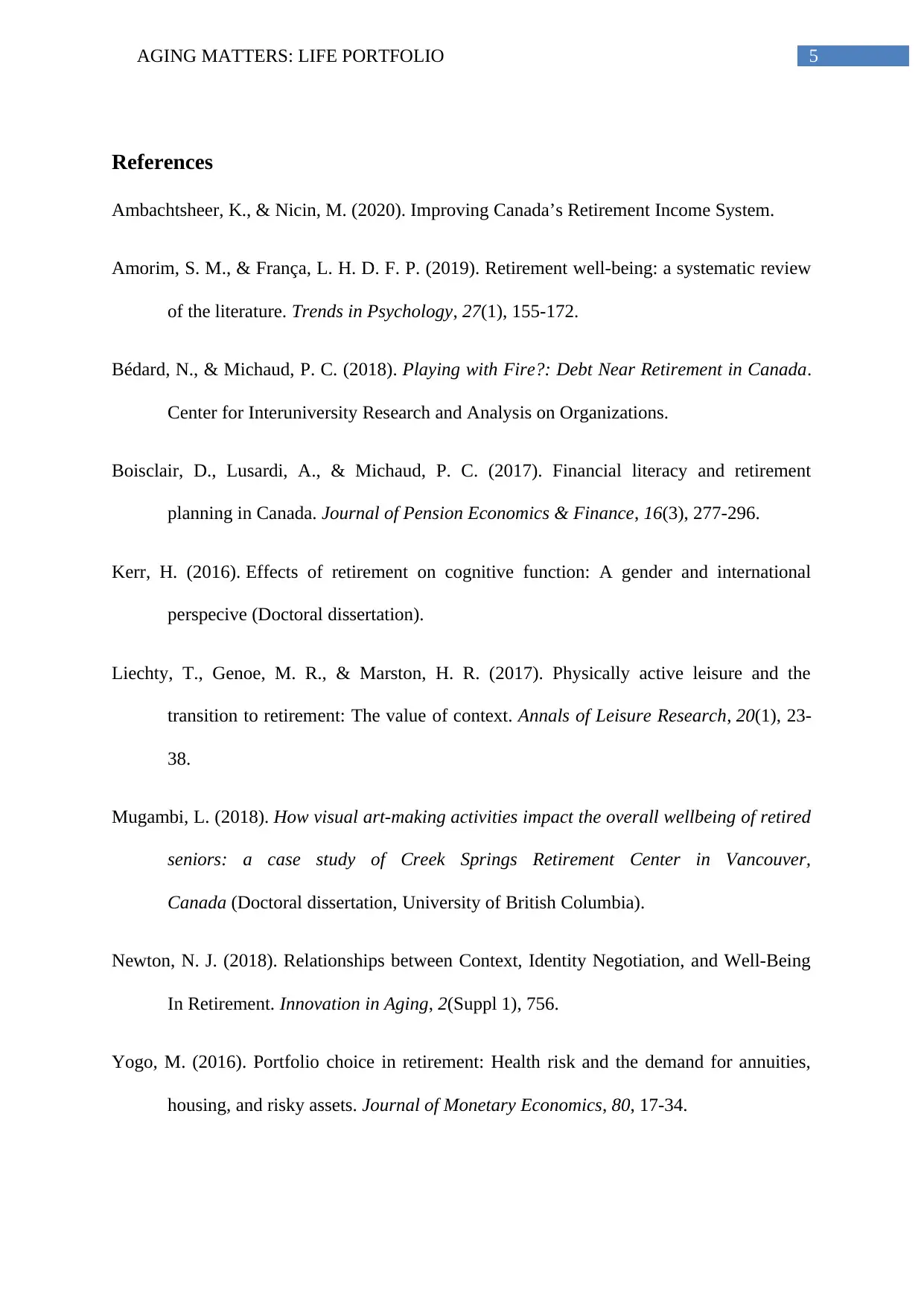
5AGING MATTERS: LIFE PORTFOLIO
References
Ambachtsheer, K., & Nicin, M. (2020). Improving Canada’s Retirement Income System.
Amorim, S. M., & França, L. H. D. F. P. (2019). Retirement well-being: a systematic review
of the literature. Trends in Psychology, 27(1), 155-172.
Bédard, N., & Michaud, P. C. (2018). Playing with Fire?: Debt Near Retirement in Canada.
Center for Interuniversity Research and Analysis on Organizations.
Boisclair, D., Lusardi, A., & Michaud, P. C. (2017). Financial literacy and retirement
planning in Canada. Journal of Pension Economics & Finance, 16(3), 277-296.
Kerr, H. (2016). Effects of retirement on cognitive function: A gender and international
perspecive (Doctoral dissertation).
Liechty, T., Genoe, M. R., & Marston, H. R. (2017). Physically active leisure and the
transition to retirement: The value of context. Annals of Leisure Research, 20(1), 23-
38.
Mugambi, L. (2018). How visual art-making activities impact the overall wellbeing of retired
seniors: a case study of Creek Springs Retirement Center in Vancouver,
Canada (Doctoral dissertation, University of British Columbia).
Newton, N. J. (2018). Relationships between Context, Identity Negotiation, and Well-Being
In Retirement. Innovation in Aging, 2(Suppl 1), 756.
Yogo, M. (2016). Portfolio choice in retirement: Health risk and the demand for annuities,
housing, and risky assets. Journal of Monetary Economics, 80, 17-34.
References
Ambachtsheer, K., & Nicin, M. (2020). Improving Canada’s Retirement Income System.
Amorim, S. M., & França, L. H. D. F. P. (2019). Retirement well-being: a systematic review
of the literature. Trends in Psychology, 27(1), 155-172.
Bédard, N., & Michaud, P. C. (2018). Playing with Fire?: Debt Near Retirement in Canada.
Center for Interuniversity Research and Analysis on Organizations.
Boisclair, D., Lusardi, A., & Michaud, P. C. (2017). Financial literacy and retirement
planning in Canada. Journal of Pension Economics & Finance, 16(3), 277-296.
Kerr, H. (2016). Effects of retirement on cognitive function: A gender and international
perspecive (Doctoral dissertation).
Liechty, T., Genoe, M. R., & Marston, H. R. (2017). Physically active leisure and the
transition to retirement: The value of context. Annals of Leisure Research, 20(1), 23-
38.
Mugambi, L. (2018). How visual art-making activities impact the overall wellbeing of retired
seniors: a case study of Creek Springs Retirement Center in Vancouver,
Canada (Doctoral dissertation, University of British Columbia).
Newton, N. J. (2018). Relationships between Context, Identity Negotiation, and Well-Being
In Retirement. Innovation in Aging, 2(Suppl 1), 756.
Yogo, M. (2016). Portfolio choice in retirement: Health risk and the demand for annuities,
housing, and risky assets. Journal of Monetary Economics, 80, 17-34.
⊘ This is a preview!⊘
Do you want full access?
Subscribe today to unlock all pages.

Trusted by 1+ million students worldwide
1 out of 6
Related Documents
Your All-in-One AI-Powered Toolkit for Academic Success.
+13062052269
info@desklib.com
Available 24*7 on WhatsApp / Email
![[object Object]](/_next/static/media/star-bottom.7253800d.svg)
Unlock your academic potential
Copyright © 2020–2026 A2Z Services. All Rights Reserved. Developed and managed by ZUCOL.




